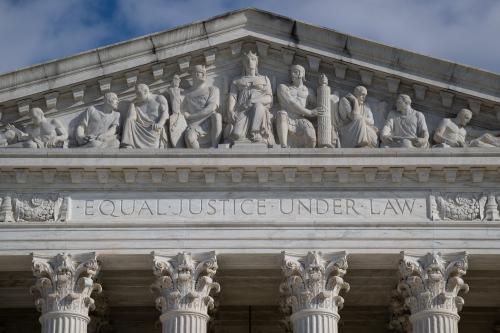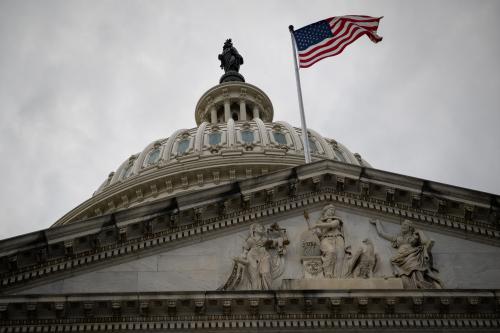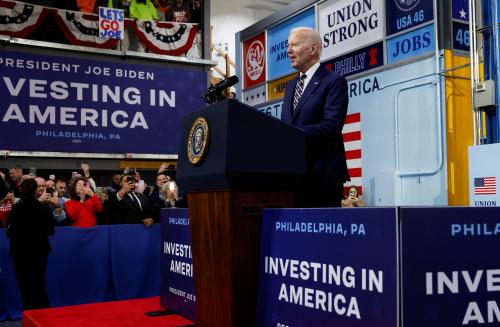Conventional wisdom would have us believe that politicians are rewarded electorally when they spend a lot of money or “bring home the bacon.” But is this true in our era of extreme polarization? This question is likely to be asked again as President Biden and Congressional Democrats attempt to claim credit for two major pieces of legislation that invest billions in domestic industries. They are the CHIPS and Science Act, which provides for new spending on semiconductor manufacturing, research and development, and the Inflation Reduction Act (IRA), which contains investments in cleaner energy. The investments are likely to be a substantial boon for local communities — but research shows that Biden and the Democrats will not necessarily reap political benefits.
A real challenge facing politicians is how to take credit for legislation. When bills contain benefits for particular constituencies or communities, legislators want to be able to campaign on those benefits. But for that process to operate, voters need to (1) recognize the benefit, (2) recognize that it results from government action, (3) correctly identify which party or lawmakers are responsible, and (4) support that party or those legislators at higher rates. In our current political climate, that is especially difficult to achieve.
First, there’s the media barrier. A lot of people receive very little news, and even highly politically engaged people do not receive a lot of local news. It does not help when many different policies are packaged together into one bill, as is common these days — particularly when the legislation has a name as uninformative as the Inflation Reduction Act. So, the media and information environment are one obstacle to people learning about government investments in the local economy.
Second, there’s the partisanship barrier. Even if voters knew the government just invested millions locally, they would have to respond by altering their voting behavior. The two pieces of legislation differ in their partisan flavor; the CHIPS Act passed with some Republican support, while the IRA passed on a party-line vote. When it comes to the IRA, then, voters would have to respond by being more likely to vote for Democrats. But a highly polarized political environment means it is less likely for voters to switch parties and a side-effect of the relatively high turnout in recent elections means that there may be less room to get more voters to the polls. On the CHIPS Act, by contrast, the partisan dynamic is more muted. Without the partisan cue, it might be challenging for voters to know whether to reward their legislator for the local spending. Take the bipartisan infrastructure bill passed in 2021; politicians who opposed that legislation later took credit for it.
So it is hard for legislators to get the credit they deserve; it is also hard to avoid blame. I have studied how various federal initiatives were perceived during the early years of the Obama Administration. An example that might seem relevant is the critiques of Solyndra, a solar cell company that went bankrupt in 2011 after receiving a large federal loan. This was a talking point for conservatives for several years. But it is worth remembering other, more prevalent and plausibly more persuasive talking points had no basis in fact at all. In my interviews with Tea Party activists, I found high levels of concern about “Obama phones”, a false claim that welfare recipients were receiving free high-end smartphones and about “death panels,” the false idea that under the Affordable Care Act end-of-life decisions would be made by bureaucrats rather than patients. Both of these were untrue but widely repeated. Given the willingness of major political figures to promote false claims, bad-faith partisan attacks on the recent industrial investments are probably unavoidable.
The real question is how much those attacks will matter in the aggregate. The best point of comparison for the Inflation Reduction Act is undoubtedly the American Recovery and Reinvestment Act (ARRA), the economic stimulus package that was passed at the beginning of the Obama Administration. The evidence suggests that spending might cut both ways. In a paper I coauthored with Katherine Einstein and Kris-Stella Trump on the political effects of ARRA, we found that more local spending turned red areas redder and blue areas bluer.

The figure above shows the results we found for the change in Democratic vote share in the House of Representatives between 2008 and 2012. On the left are counties where democratic vote share was very low (“red” counties), and on the right are counties where Democratic vote share was very high (“blue” counties). As you can see, the predicted effect of stimulus spending was negative for the reddest counties and positive for bluest ones. That is, spending further polarized already polarized places.
Definitely not great news, given the current political climate. But the politics of the new industrial policies do not need to be a repeat of Obama’s economic stimulus package. The Biden Administration has intended their industrial investments to spur unionization, and unions are demonstrably effective at informing workers about relevant issues and spurring voter turnout. Given that much of the benefit from CHIPS and IRA will be in specific industrial sectors, there is good reason to imagine unions could be a powerful factor in shaping public understanding of these legislative achievements.
If politicians want to be able to run on industrial policy, they should not just expect voters to automatically reward policymaking that benefits them. If they want credit for investing in infrastructure, they need to build a second infrastructure — a communications infrastructure — to tell voters what their legislative record means for the local community. For politicians who want to run on their economic record, it is important to know: you can’t expect the money to do the talking.







Commentary
Do politicians get rewarded for spending money?
March 22, 2023